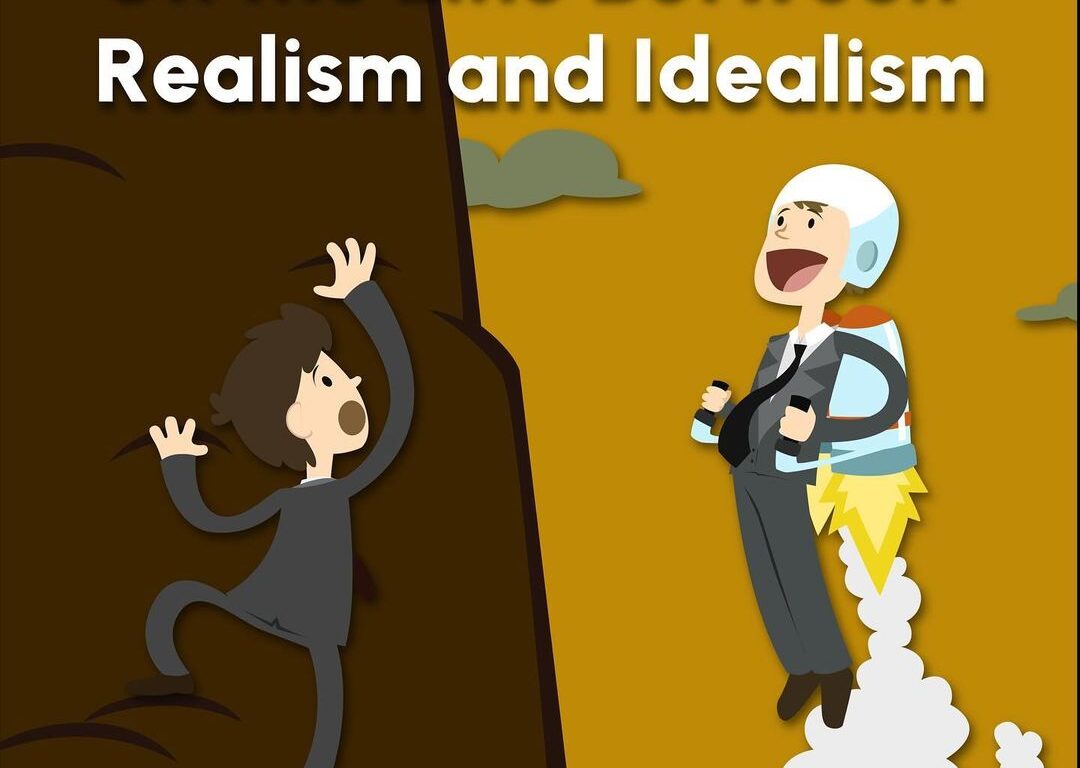I envision the universe as a dice, as a game, a mere chance. Six sides, six outcomes, until the dice tilts and balances on its edge. What now? That edge, my friends, is the distinguishing line between realism and idealism. Idealism and Realism, technically speaking, are two terms that lie on opposite ends of a spectrum due to their contradictory implications. Idealism is derived from the term ‘ideal’, and realism from ‘real’. It seems quite self explanatory, and it might have been (in an ideal world).
Idealism can be conceived as complete delusion, misapprehension, or even mere daydreaming in order to escape from reality. Many believe in the notion that maths is the language of the universe. Now instead of focusing on English class, you begin to think about how algebra came into existence, and what Al-Khwarizmi was thinking—if he was.
If my world was perfect, the Great Wall of China would be made out of chocolate and I’d be the 71st Roman Emperor. Romantics envision their perfect world to cope with the substance they have been offered in their average reality, and even attempt to manifest and obtain opportunities to experience their perfect scenario. These dreamers are often told to touch grass and get a grip (I understand why).
Realism, on the other hand, could be classified as going-with-the-flow. As a movement in the arts, Realism embodied the presentation of real life as truthfully as possible, emerging in reaction to Romanticism. Realists seem unnerved by the countless ‘what ifs’. Realism revolves around what exists, and states that ‘what does not exist, simply does not.’ Being realistic is also inferred as being boring. Is ‘acceptance of the nature of the universe’ really tedious?
It is quite intriguing how time is jokingly referred to as a ‘social construct’. What happened in the past is no longer relevant, and what may happen in the future is unknown. To state that time passes is stating that the current events will not necessarily prevail, and that time cannot pass if there is no distinction between the events of the past, present and future. Various philosophers claimed that time is mere intuition of the human mind, whilst others call it a phenomena of the universe. Is the famous claim that “time heals” simply a merrier way of stating that once the spectrum of the events is at a distance, they will be forgotten? The passage of time may be realistic, but the statistics of it may be some idealistics observations or assumptions.
It tickles my brain how being pragmatic is perceived as being unambitious and pessimistic. A pragmatic is viewed as narrow-minded and someone with not much to chase after. However, what if the pragmatic is not narrow minded, and those who make such scornful probes are the true guilty culprits?
The question arises: what truly has morphed our current predicament? The idealists and the daydreamers, or the practical and the realists? The answer is both.
A fresh string of endless possibilities begins once we start considering idealism and realism as the branches of the same tree. Idealism can be pondering about the ideal scenario, whereas realism can be discovering ways to balance it with the scale of reality. Dreams can come true after all, don’t they? It’s vital to note how people claim that manifesting their dream life worked quite excellently for them, although the question remains: was it their belief in external sources and patterns, their own subconsciousness that pushed them towards success or was it their own desperation and yearning that drove them forward?
In a sense, manifesting your ideal reality is merely working towards it with the given circumstances of your reality. Could this mean realities can be altered? Yes, altered, not changed entirely, though who knows? Labelling idealistic worldviews as merely daydreaming is simply restricting the world to its current terms and conditions. Apps crash if updated policies and terms are not brought about, and I’d say the same for existence. The world didn’t evolve from whole buildings being computers to compact devices just with a small snap.
Revolutionaries were idealists who were shunned by society. Galileo declared that the earth revolved around the sun, and was ridiculed and punished. Today, do we deny that the earth orbits the big burning ball? On the other hand, some ideologies were accepted yet could not be fulfilled entirely, and this grants me the perfect opportunity to discuss communism!!! Karl Marx elaborated on Communism in the ‘Communist Manifesto,’ yet the ideology was not fully done justice, and the nations we refer to as communists are equally as guilty. China and the Soviet Union called dibs for the front seat to the communist show with banners saying ‘ WE ARE COMMUNISTS!!’, whilst being mere dictatorships. Communism in its original claim, remains an ideology that still has not been adopted, even by the USSR who we generously give the title of ‘Communist Party’.
Could this mean the Roman empire can still be reinstated a century from now on? The re-establishment of the USSR? Could this mean we may discover a multiverse? Maybe teleportation? Is human capability and fortune truly limited to what currently exists? Can one truly beat the odds? Some idealists live long enough to see their ideologies turn into realities, while others don’t. Is the life of an ideologist the price paid to the piper for the human race to reassume reality?
By Sarah Bilal
Guest Writer (TLC 2023-2024)
Note: the views expressed in the article solely belong to the writer and do not reflect TLC.

